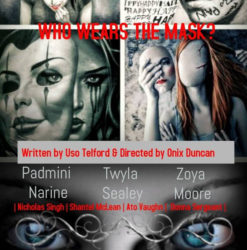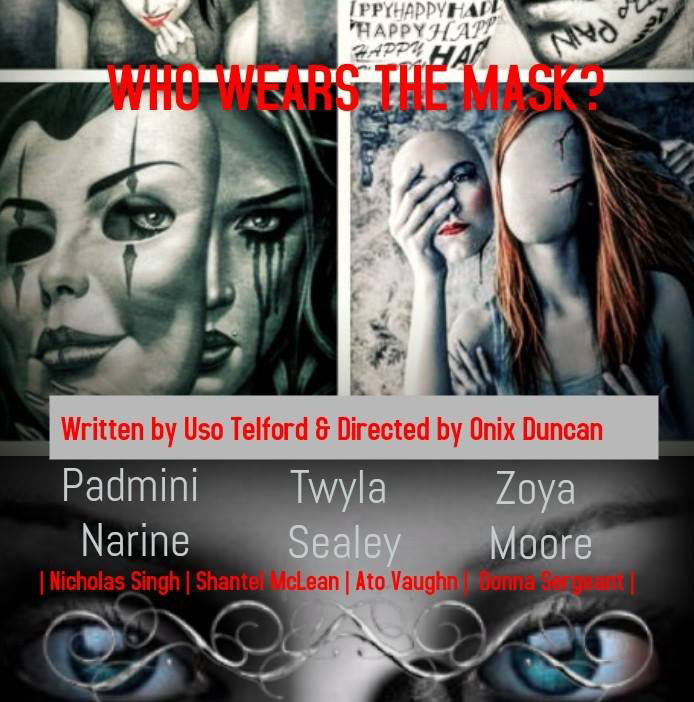
One overall gain in looking at the plays in the festival is that it is an exhibition of contemporary Guyanese theatre and provides a true study of it. This exhibition, and the opportunity for investigation have been quite rewarding, as was the case last year. The preliminaries of the 2016 Festival are now in progress. It has been interesting to see what has emerged among the entries so far.

Among the plays seen so far in the preliminaries is Duenne by Paloma Mohamed produced by the Theatre Guild. It is not a new play. It is more than 16 years old, but it won the Guyana Prize for Drama because of its clever use of theatre to treat the subject of abortion which was very topical at the time it was written. It uses symbolism to enter the mind of a woman who chose to abort, interacting with the unborn spirit and its relationship with God and God’s (dis)connection with the human world. It shows a form of theatre not often encountered on the Guyanese stage, but, as one of the existing established plays featured in the Festival it represents other new plays that similarly go off into innovative styles of drama.
Another is Who Wears the Mask by Uso Telford, directed by Onix Duncan, which departs from realism in its high uses of psychological drama which lends itself to the psychoanalytic. It enters the mind of a girl as she grows up, and while not exactly showing schizophrenia, it shows dominance and brainwashing resulting in a split and damaged personality. There are extensions of the mind in both the use of symbols, extensions into other characters and ironic reversals.
Further, there is the theatre of cruelty so vividly remembered from Rae Wiltshire’s Playing Chess With A Blind Man from the NDF 2015. A bit of this delving into the dark side of the imagination is seen in The Perfect Man by Ato Vaughn, directed by Tristana Roberts, both students of the National School of Theatre Arts and Drama (NSTAD). This one-act play delves into the occult as well as post-modern horrific thinking and theatre of cruelty for a tale of fantasy with an ironic outcome.
Purge, written and directed by Sonia Yarde, also takes an excursion into the psychological. The focus is Christian extremity that leads to psychotic obsession. It dramatises a mad mind of a pastor who confuses the Godlike doctrine of ‘vengeance is mine’. It includes a daughter on the fringe of psychological domination and self-guilt. It carries themes of the rights of the LBGT community and an ironic interpretation of ‘sexual sins’. The drama does all of this in a plot that is carried by mystery and suspense. A play like this relates to the contemporary society which is fraught with the extremes to which one can take interpretations of Christian doctrine, the Bible and morality and is yet another play with interplays of irony.
A few other plays seen so far in the preliminaries are social realism, but have extreme contents of cruelty, violence, and sexuality. One such is Lakeisha Adams’ Tales of A Tortured Woman, which is also quite dark in its look into tragic humanity. It is directed by Lisa Adams and is yet another play out of the NSTAD. This play has a clear statement to make about abuse. It is a disturbing trip into domestic violence and abuse. This is yet another psychological study of mental destruction and tragedy. Here is another reminder of the way the darker under-reachings of human ills plague the society and have influenced so many of the new playwrights.
That is certainly the case with another drama from NSTAD, Faithful Are The Wounds of A Friend by Ackeeni Bentinck directed by Kevon Henry. This one, too, has touches of theatre of cruelty in the way it surprisingly turns towards the end. This is the application of the technique of deceptiveness by the dramatist who entices and misleads her audience with elements of rollicking humour in the earlier scenes mixed with melodrama. Like Lakeisha Adams’ play it is the drama of a wronged woman and takes on the elements of a tale of vengeance. This drama of four women, one of whom is trying to hide her secret descent into excessive drinking, while two others are hiding secrets that are even deeper and much more sinister, erupts into major surprises at the end.
What is of further interest is the way the drama of realism extends itself in a variety of fashions. While we say that social realism is a dominant factor on the stage, its use is far from homogenous and certainly not monotonous. The entries in the NDF 2016 illustrate this.
The new play by Ashraf Dabi, which he also directed, Death and All Her Friends, exemplifies this. It shows the aftermath of the dangerous quicksand vacuum that opens up and is virtually created by the death of the father in a family. The family breaks up and sinks into dysfunctionality around the deterioration of the surviving mother. She collapses into alcoholism and some form of mental semi-derangement, leaving her children vulnerable and victim to destructive influences. The play explores suicide, temptation and exploitation. This one, too, has a message to give its audience.
Not very far removed from that is Little Garden of Bitter Weeds by Lloyd Thomas, directed for NDF 2016 by Sonia Yarde. This play was done by Thomas, a graduate of NSTAD, for St Joseph High and won the Secondary Schools category last year. Its return this year in the adult category of the festival is a good sign of the way the new plays created for the festival might have joined the general corpus of Guyanese plays available to be performed.
It explores themes of envy, deceit, infidelity, spite and pride, showing the tragic outcome of how these conspire to destroy a family, aided by the neglect of a daughter and the careless blindness of the disbelieving mother. This tragic ending is hastened by spiteful covetousness which led to the intervention of obeah. Obeah here serves quite an ironic purpose as it is actually an element of retribution.
Coma is a different kind of play from those, and with no special intrigue. It was written by Nigerian Jude Idada and is another work directed by Yarde. This is the drama of a sister and brother torn between whether or not they should pull the life-plug from their mother who has been in an irreversible coma in a hospital for several months. There is great conflict between them at the centre of a drama that is intertwined with a number of other known and unknown issues and conflicts that have plagued the family history while the brother struggles with his own domestic conflict that he fails to keep a secret. This one is melodrama.
Another type of play that for long periods of time dominated the theatre in Guyana is the comedy. Plays of laughter lead popular theatre and have been highly demanded by the popular audience. One of these is A Scheme Yard Affair written by Runasi Perry and directed by Linden Isles. It is a very worthy and competently written comedy which thrives on its manner of hilarious farce.
It dramatises the colourful carryings-on in a Guyanese scheme yard – a specific type of tenement yard or nigger yard and in this way is a work of social realism. Its writing is slick, with vivid sexuality, colourful language and excellent one-liners.
Alongside this is another comic drama which is nevertheless quite different from Scheme Yard. This one is Coo-Coo’s Nest by Melinda Primo-Solomon directed by herself. It surrounds the devious work of a fake obeah-woman, quite blatantly a con-woman using false obeah as a trade on the side. Her game goes into using sexuality to prey on men. She weaves quite a web of deceit that eventually multiplies around her in choking fashion. The play uses farce to considerable advantage while creating a lead role that is an actress’ dream. It calls for slick, versatile acting switching from one face, one mood, one personality to another, sometimes in the split of a minute.
That list provides an idea of the great variety of plays on show last week in the first half of the NDF preliminaries. There are many others not mentioned. Not all of them are really good, but most are very significant in the study of the Guyanese theatre that the NDF affords.





